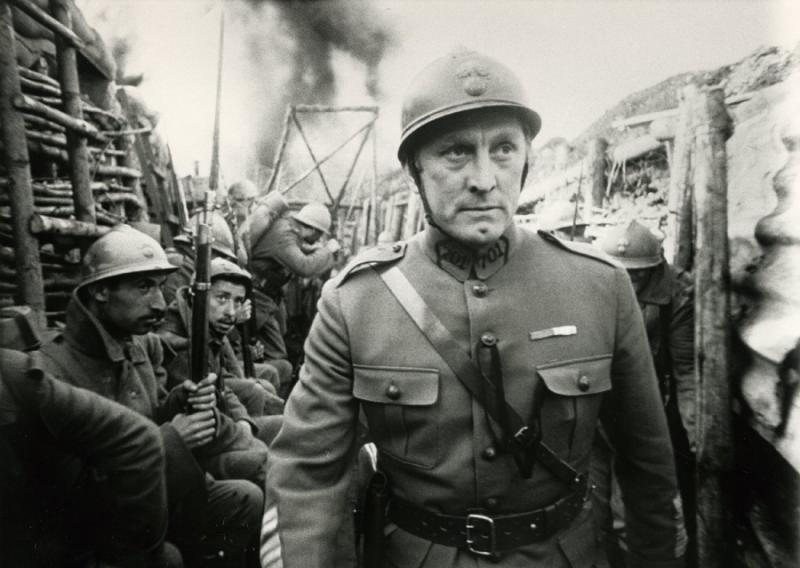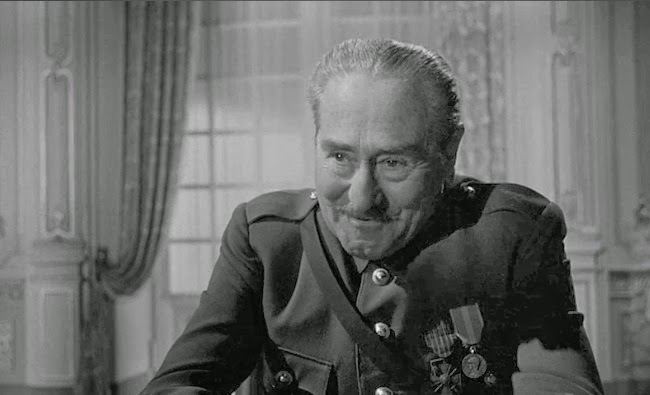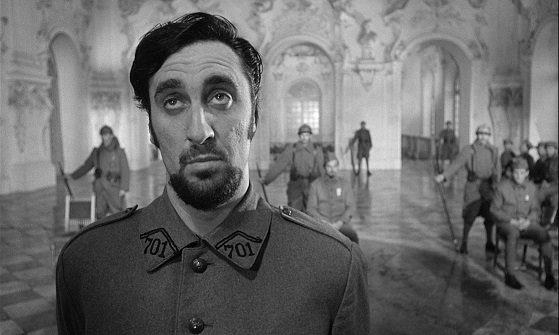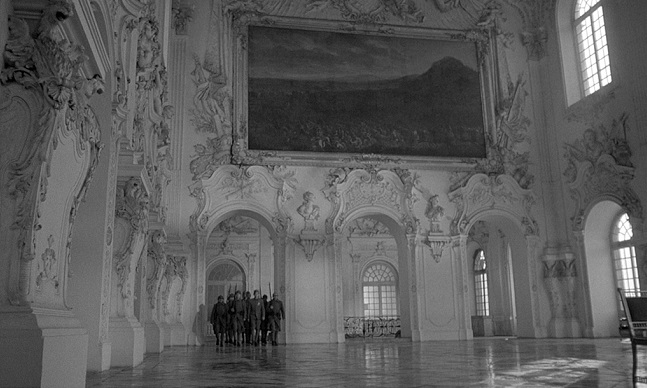Paths of Glory | reviews, news & interviews
Paths of Glory
Paths of Glory
Kubrick's intellectual anti-war film is too beautiful for its own good

Paths of Glory (1957) stars Kirk Douglas as a First World War colonel who's as fearless leading his poilus on a suicide mission as he is arguing for mercy for three of the survivors. A lawyer in peacetime, he defends them when they are tried as cowards before a panel of French officers who have no intention of exonerating them.
Stanley Kubrick's fourth feature was adapted from Humphrey Cobb's 1935 novel, which was inspired by the French execution of soldiers chosen arbitrarily to pay for the disciplinary failure of their unit during an attack in the Marne. In February 1915, at Souain-Perthes-lès-Hurlus, General Géraud Réveilhac became frustrated by his 60th Infantry's repulses from a German position. He demanded that his divisional artillery fire on a French trench to force the soldiers there to attack, but the artillery commander refused to comply without a written order. Réveilhac subsequently had 30 men tried as mutineers. Four were executed. A year later, Réveilhac was relieved of his command and given a reserve unit.
 Paths of Glory begins at an opulent chateau where, in 1916, the urbane, devious General Broulard (Adolphe Menjou, pictured right) and his ambitious subordinate, General Mireau (George Macready), are secluded from the squalor of the trenches. The scar on Mireau's right cheek indicates he is not a coward personally, but – claiming concern for his 8,000 men – he is reluctant to follow Broulard's order to direct his division against a formidable German position called the Anthill. He changes his mind immediately when Broulard says he will be rewarded with promotion if the attack is successful.
Paths of Glory begins at an opulent chateau where, in 1916, the urbane, devious General Broulard (Adolphe Menjou, pictured right) and his ambitious subordinate, General Mireau (George Macready), are secluded from the squalor of the trenches. The scar on Mireau's right cheek indicates he is not a coward personally, but – claiming concern for his 8,000 men – he is reluctant to follow Broulard's order to direct his division against a formidable German position called the Anthill. He changes his mind immediately when Broulard says he will be rewarded with promotion if the attack is successful.
On his rounds, during which he strikes a shell-shocked soldier, Mireau clashes with Colonel Dax (Kirk Douglas), commander of the 701st, who makes the mistake of quoting Dr Johnson at him: "Patriotism is the last refuge of the scoundrel." A nocturnal foray by Lieutenant Roget (Wayne Morris), Corporal Paris (Ralph Meeker), and a private (Kem Dibbs) ends with the latter being killed by a grenade thrown by the panicking Roget. Paris threatens to report him, starting a sequence of events that will factor into the trial for cowardice of Paris and two other innocent soldiers (Timothy Carey, Joe Turkel). This subplot underscores Dax's struggle against Mireau for justice.
During the disastrous French advance, Mireau realises that Roget's men have remained in their trench and apoplectically orders that they be shelled into action. Like Réveilhac, he is thwarted by a conscientious artillery officer. Following the rout, he demands that 10 men from each company be tried for cowardice under penalty of death, but grudgingly relinquishes this Roman Republican Army practice of "decimation", which was in use by 471 BC, according to Livy. Mireau trades down to three defendants. Dax does his best for them in a kangaroo court (Timothy Carey, pictured below). He subsequently learns of Mireau's irrational order.
 Kubrick's part-epic anti-war drama is one of those feted films that warrant adjectives like "important", "impressive", and "admirable". That's another way of saying, of course, that it is relentlessly cerebral, as are most of Kubrick's movies, including those – Lolita (1962), Barry Lyndon (1975), Eyes Wide Shut (1999) – that deal with sex and love.
Kubrick's part-epic anti-war drama is one of those feted films that warrant adjectives like "important", "impressive", and "admirable". That's another way of saying, of course, that it is relentlessly cerebral, as are most of Kubrick's movies, including those – Lolita (1962), Barry Lyndon (1975), Eyes Wide Shut (1999) – that deal with sex and love.
The lionised director may have been sincere in denouncing the militarism and top brass malfeasance that reaped mass slaughter on the Western Front 100 years ago, but his self-consciously arty detachment and studied solemnity undercut his moral outrage. It would be the same with his bifurcated Vietnam War film Full Metal Jacket (1987), although neither movie lacks power in demonstrating the dehumanising effects of war.
Full Metal Jacket is sustained by its modernist strangeness, bordering on the hallucinatory, and the way it conveys the loss of reason at the Parris Island boot camp and in the rubble of Huế (reminiscent of Ypres or Arras) during the Tet Offensive. In the more conventional Paths of Glory, the depiction of the French infantry's insane advance across no man's land under German bombardment is a testament to the lunacy of attritional warfare. Douglas's turn as the courageous, compassionate, and principled Dax was relatively naturalistic compared with the faintly caricatured performances of his co-stars, which augured not only the satire of Kubrick's Dr Strangelove (1964) but also the music-hall pastiche of Richard Attenborough's Oh! What a Lovely War (1969).
The overarching problem with Paths of Glory is its inappropriate beauty. Georg Krause's spectacular black and white cinematography shows slanted rays of light pouring through the chateau's windows and illuminating even the trenches as Dax strides along them readying his troops. Deep-focus shots penetrate rooms beyond rooms in the cathedral-like chateau (pictured below). The sacred atmosphere was possibly intended as an ironic backdrop for the spiritually empty prayers offered to the condemned men by the unfeeling priest (Emile Meyer) who visits them in their cell. But perhaps Kubrick simplify couldn't resist the urge to douse the tragedy in atmosphere. The unrelenting dankness and darkness of Joseph Losey's King & Country (1964) is more eloquent than Paths of Glory's stylisation.
 If Paths of Glory is ultimately about the perfidiousness and self-seeking of generals that turns men into cannon fodder, it concludes with a glimmer of hope. After the trial and its aftermath, Dax is alerted to a commotion in a café and, remaining outside, listens to common soldiers of all ages baying at a captured German girl, who is forced to sing for them.
If Paths of Glory is ultimately about the perfidiousness and self-seeking of generals that turns men into cannon fodder, it concludes with a glimmer of hope. After the trial and its aftermath, Dax is alerted to a commotion in a café and, remaining outside, listens to common soldiers of all ages baying at a captured German girl, who is forced to sing for them.
However, the tremulousness of her voice and the homey sentiments of "The Faithful Hussar" elicits their empathy. They stop barracking her and begin to hum along. (The scene was echoed in the 1916 Ireland episode of Ken Loach 1975 drama serial Days of Hope, written by Jim Allen.) The soldiers' volte face reminds Dax that humanity is not built on greed and contempt – only that part of it which, in his experience, wears the gold-braided képis.
Overleaf: watch the trailer to Paths of Glory
rating
Explore topics
Share this article
The future of Arts Journalism
You can stop theartsdesk.com closing!
We urgently need financing to survive. Our fundraising drive has thus far raised £49,000 but we need to reach £100,000 or we will be forced to close. Please contribute here: https://gofund.me/c3f6033d
And if you can forward this information to anyone who might assist, we’d be grateful.

Subscribe to theartsdesk.com
Thank you for continuing to read our work on theartsdesk.com. For unlimited access to every article in its entirety, including our archive of more than 15,000 pieces, we're asking for £5 per month or £40 per year. We feel it's a very good deal, and hope you do too.
To take a subscription now simply click here.
And if you're looking for that extra gift for a friend or family member, why not treat them to a theartsdesk.com gift subscription?
more Film
 London Film Festival - from paranoia in Brazil and Iran, to light relief in New York and Tuscany
'Jay Kelly' disappoints, 'It Was Just an Accident' doesn't
London Film Festival - from paranoia in Brazil and Iran, to light relief in New York and Tuscany
'Jay Kelly' disappoints, 'It Was Just an Accident' doesn't
 Iron Ladies review - working-class heroines of the Miners' Strike
Documentary salutes the staunch women who fought Thatcher's pit closures
Iron Ladies review - working-class heroines of the Miners' Strike
Documentary salutes the staunch women who fought Thatcher's pit closures
 Blu-ray: The Man in the White Suit
Ealing Studios' prescient black comedy, as sharp as ever
Blu-ray: The Man in the White Suit
Ealing Studios' prescient black comedy, as sharp as ever
 The Woman in Cabin 10 review - Scandi noir meets Agatha Christie on a superyacht
Reason goes overboard on a seagoing mystery thriller
The Woman in Cabin 10 review - Scandi noir meets Agatha Christie on a superyacht
Reason goes overboard on a seagoing mystery thriller
 London Film Festival 2025 - crime, punishment, pop stars and shrinks
Daniel Craig investigates, Jodie Foster speaks French and Colin Farrell has a gambling habit
London Film Festival 2025 - crime, punishment, pop stars and shrinks
Daniel Craig investigates, Jodie Foster speaks French and Colin Farrell has a gambling habit
 I Swear review - taking stock of Tourette's
A sharp and moving tale of cuss-words and tics
I Swear review - taking stock of Tourette's
A sharp and moving tale of cuss-words and tics
 A House of Dynamite review - the final countdown
Kathryn Bigelow's cautionary tale sets the nuclear clock ticking again
A House of Dynamite review - the final countdown
Kathryn Bigelow's cautionary tale sets the nuclear clock ticking again
 theartsdesk Q&A: Idris Elba on playing a US President faced with a missile crisis in 'A House of Dynamite'
The star talks about Presidential decision-making when millions of lives are imperilled
theartsdesk Q&A: Idris Elba on playing a US President faced with a missile crisis in 'A House of Dynamite'
The star talks about Presidential decision-making when millions of lives are imperilled
 Urchin review - superb homeless drama
Frank Dillane gives a star-making turn in Harris Dickinson’s impressive directorial debut
Urchin review - superb homeless drama
Frank Dillane gives a star-making turn in Harris Dickinson’s impressive directorial debut
 Mr Blake at Your Service review - John Malkovich in unlikely role as an English butler
Weird comedy directed by novelist Gilles Legardinier
Mr Blake at Your Service review - John Malkovich in unlikely role as an English butler
Weird comedy directed by novelist Gilles Legardinier
 Don't Let's Go to the Dogs Tonight review - vivid adaptation of a memoir about a Rhodesian childhood
Embeth Davidtz delivers an impressive directing debut and an exceptional child star
Don't Let's Go to the Dogs Tonight review - vivid adaptation of a memoir about a Rhodesian childhood
Embeth Davidtz delivers an impressive directing debut and an exceptional child star

Add comment